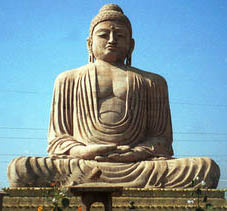| Buddhism |
 |
Buddhism originated as an offshoot of Hinduism in India, but eventually it became popular all over Asia. The personality and teachings of Gautam Buddha, the founder of this faith, have illumined the lives of millions of people in Japan, China and Southeast Asia.
There are strong lines of similarity between Buddhism and the basic teachings of Hinduism. Buddhism is based on the principle or the law of impermanence. According to this, everything is subject to change, although some things may last longer than others.
The other basic principle of Buddhism is the law of causation, according to which nothing occurs due to pure chance. Besides natural forces, it is the karma which leads to the occurrence of all events. The popular notions of the indestructible soul and the cycle of rebirth emerge from these two basic philosophies.
Buddha advocated the Middle Path, in which he offered a balanced, harmonious way of life, steering between two extremes of self-indulgence and total abstinence. Buddhism rests upon four Noble Truths:
|
(i) suffering is universal
(ii) it is caused by desire and yearning
(iii) suffering can be prevented and overcome
(iv) eradication of desires can lead to removal of suffering.
To prevent suffering one has to conquer craving and desire and this conquest leads to the attainment of nirvana or complete enlightenment.
|
 |
|
|
| Festivals |
The Indian calendar is one long procession of festivals. These are as varied in origin as they are large in number. There are innumerable national, regional, local, religious, seasonal and social festivities. This is not surprising considering the fact that India is the land of gods, goddesses, saints, gurus and prophets.
Festivals here are characterised by colour, gaiety, enthusiasm, feasts and a variety of prayers and rituals. Travellers are struck by the scale and multiplicity of the festivities that populate the cultural scene of this land.
|
| Read more about Indian Festivals |
|
|
